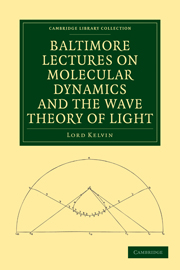Book contents
- Frontmatter
- PREFACE
- Contents
- ERRATA
- NOTES OF LECTURES ON MOLECULAR DYNAMICS AND THE WAVE THEORY OF LIGHT
- ADVERTISEMENT
- LECTURE I
- LECTURE II
- LECTURE III
- LECTURE IV
- LECTURE V
- LECTURE VI
- LECTURE VII
- LECTURE VIII
- LECTURE IX
- LECTURE X
- LECTURE XI
- LECTURE XII
- LECTURE XIII
- LECTURE XIV
- LECTURE XV
- LECTURE XVI
- LECTURE XVII
- LECTURE XVIII
- LECTURE XIX
- LECTURE XX
- APPENDIX A ON THE MOTION PRODUCED IN AN INFINITE ELASTIC SOLID BY THE MOTION THROUGH THE SPACE OCCUPIED BY IT OF A BODY ACTING ON IT ONLY BY ATTRACTION OR REPULSION
- APPENDIX B NINETEENTH CENTURY CLOUDS OVER THE DYNAMICAL THEORY OF HEAT AND LIGHT
- APPENDIX C ON THE DISTURBANCE PRODUCED BY TWO PARTICULAR FORMS OF INITIAL DISPLACEMENT IN AN INFINITELY LONG MATERIAL SYSTEM FOR WHICH THE VELOCITY OF PERIODIC WAVES DEPENDS ON THE WAVE-LENGTH
- APPENDIX D ON THE CLUSTERING OF GRAVITATIONAL MATTER IN ANY PART OF THE UNIVERSE
- APPENDIX E AEPINUS ATOMIZED
- APPENDIX F
- APPENDIX G HYDROKINETIC SOLUTIONS AND OBSERVATIONS
- APPENDIX H ON THE MOLECULAR TACTICS OF A CRYSTAL
- APPENDIX I ON THE ELASTICITY OF A CRYSTAL ACCORDING TO BOSCOVICH
- APPENDIX J MOLECULAR DYNAMICS OF A CRYSTAL
- APPENDIX K ON VARIATIONAL ELECTRIC AND MAGNETIC SCREENING
- APPENDIX L ELECTRIC WAVES AND VIBRATIONS IN A SUBMARINE TELEGRAPH WIRE
- INDEX
LECTURE I
Published online by Cambridge University Press: 05 March 2012
- Frontmatter
- PREFACE
- Contents
- ERRATA
- NOTES OF LECTURES ON MOLECULAR DYNAMICS AND THE WAVE THEORY OF LIGHT
- ADVERTISEMENT
- LECTURE I
- LECTURE II
- LECTURE III
- LECTURE IV
- LECTURE V
- LECTURE VI
- LECTURE VII
- LECTURE VIII
- LECTURE IX
- LECTURE X
- LECTURE XI
- LECTURE XII
- LECTURE XIII
- LECTURE XIV
- LECTURE XV
- LECTURE XVI
- LECTURE XVII
- LECTURE XVIII
- LECTURE XIX
- LECTURE XX
- APPENDIX A ON THE MOTION PRODUCED IN AN INFINITE ELASTIC SOLID BY THE MOTION THROUGH THE SPACE OCCUPIED BY IT OF A BODY ACTING ON IT ONLY BY ATTRACTION OR REPULSION
- APPENDIX B NINETEENTH CENTURY CLOUDS OVER THE DYNAMICAL THEORY OF HEAT AND LIGHT
- APPENDIX C ON THE DISTURBANCE PRODUCED BY TWO PARTICULAR FORMS OF INITIAL DISPLACEMENT IN AN INFINITELY LONG MATERIAL SYSTEM FOR WHICH THE VELOCITY OF PERIODIC WAVES DEPENDS ON THE WAVE-LENGTH
- APPENDIX D ON THE CLUSTERING OF GRAVITATIONAL MATTER IN ANY PART OF THE UNIVERSE
- APPENDIX E AEPINUS ATOMIZED
- APPENDIX F
- APPENDIX G HYDROKINETIC SOLUTIONS AND OBSERVATIONS
- APPENDIX H ON THE MOLECULAR TACTICS OF A CRYSTAL
- APPENDIX I ON THE ELASTICITY OF A CRYSTAL ACCORDING TO BOSCOVICH
- APPENDIX J MOLECULAR DYNAMICS OF A CRYSTAL
- APPENDIX K ON VARIATIONAL ELECTRIC AND MAGNETIC SCREENING
- APPENDIX L ELECTRIC WAVES AND VIBRATIONS IN A SUBMARINE TELEGRAPH WIRE
- INDEX
Summary
The most important branch of physics which at present makes demands upon molecular dynamics seems to me to be the wave theory of light. When I say this, I do not forget the one great branch of physics which at present is reduced to molecular dynamics, the kinetic theory of gases. In saying that the wave theory of light seems to be that branch of physics which is most in want, which most imperatively demands, applications, of molecular dynamics just now, I mean that, while the kinetic theory of gases is a part of molecular dynamics, is founded upon molecular dynamics, works wholly within molecular dynamics, to it molecular dynamics is everything, and it can be advanced solely by molecular dynamics; the wave theory of light is only beginning to demand imperatively applications of that kind of dynamical science.
The dynamics of the wave theory of light began very molecularly in the hands of Fresnel, was continued so by Cauchy, and to some degree, though much less so, in the hands of Green. It was wholly molecular dynamics, but of an imperfect kind in the hands of Fresnel. Cauchy attempted to found his mathematical investigations on a rigorous molecular treatment of the subject. Green almost wholly shook off the molecular treatment, and worked out all that was to be worked out for the wave theory of light, by the dynamics of continuous matter.
- Type
- Chapter
- Information
- Publisher: Cambridge University PressPrint publication year: 2010First published in: 1904

